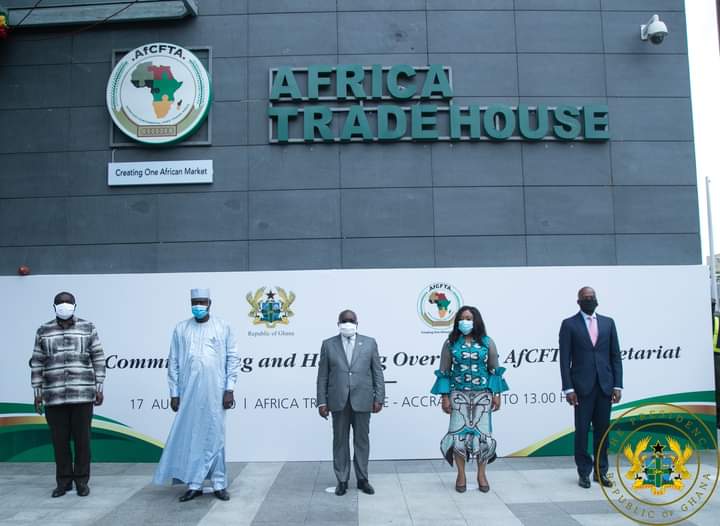Africa’s Private Sector Urged to “Own and Drive” Continental Trade Agreement
ECA estimates that by 2045 intra-African, trade in agri-food, industry, and services sectors will increase by nearly 35% compared to a situation without the AfCFTA
The private sector is recognized as an indispensable stakeholder in the African Continental Free Trade Agreement (AfCFTA), especially given its ability to catalyze sustainable economic development and job creation.

“Africa’s private sector accounts for 80 percent of total production, two-thirds of investment, and three-quarters of credit, and employs 90 percent of the working-age population,” said Stephen Karingi, Director of Regional Integration and Trade at the Economic Commission for Africa (ECA).
Read also South African Agritech Startup Nambu Group Raises Seed Round
Speaking during the opening of a three-day Africa Prosperity Dialogues on 26 January in Ghana, Mr Karingi called on captains of trade and industry to “own and drive the implementation of the AfCFTA by supporting their governments but also by holding them to account.”
ECA estimates that by 2045 intra-African trade in agri-food, industry, and services sectors will increase by nearly 35% compared to a situation without the AfCFTA. But governments must implement the Agreement “fully and effectively” for such impressive projections to come true, and the private sector must also seize the opportunities of a large single market created by the AfCFTA.
The role of the private sector was also echoed by the chairperson of the African Prosperity Network, Gabby Otchere-Darko, who stated “we (the private sector) should make the fulfillment of the promises of the AfCTA “our agenda.”
The event was officially opened by Ghana’s Vice President, Mahamudu Bawumia, who pointed out that “we have everything we need to transform Africa into a global powerhouse of the future,” adding “the AfCFTA has set the stage for Africa’s industrialization.”
Read also AfCFTA Drives Optimism Among Africa’s CEOs Despite COVID-19 Uncertainty
UN Assistant Secretary-General and Director of UNDP’s Regional Bureau for Africa, Ahunna Eziakonwa, said “it is through the AfCTA that we will industrialize” and create rather than “export African jobs”
“An Africa that produces its people’s needs is not just the Africa we want, it is the Africa we need,” Ms Eziakonwa said.
Mr Karingin noted, however, that the African private sector of which 90 percent are small and medium enterprises face challenges in conducting cross-border trade due to non-tariff barriers such as complex customs procedures, lack of access to finance, high costs of transportation and logistics, and lack of access to information, among others.
He cited inadequate infrastructure connectivity, rudimentary productive capacity, and risky or expensive payment systems as some of the barriers to trade, adding “the cost of doing business across African borders remains high, leading to the regrettable situation where African products are uncompetitive in African markets. “
Africa’s weak productive capacity and consequent excessive reliance on imports for essential products expose the continent to external shocks such as the COVID-19 pandemic and the Russia-Ukraine war.
“When Covid struck, African countries were confronted with a lack of access to basic medical supplies because Africa imports over 90 percent of its supplies. When the Russia-Ukraine crisis dawned, several African countries faced a crisis of food security because wheat and corn exports from Russia and Ukraine were suspended,” Mr. Karingi said.
The AfCFTA is expected to integrate and consolidate Africa into a single USD 2.7 trillion market by eliminating many of the barriers to trade present across the Continent. It provides the platform for Africa to diversify its economy and achieve resilience to natural and manmade shocks, including climate change.
Wamkele Mene, Secretary General of the AfCFTA Secretariat, posited that the ambition to integrate Africa dates back to the founding of the Organisation for African Unity (now the African Union). But the challenge now, he noted, is to “transform such ambition into action,” citing vaccine manufacturing in some African countries as one of the ways in which the continent is moving from ambition to action under the AfCFTA.
Read alsoMonths After Acquisition By Nigeria’s Autochek, Morocco’s Kifal Auto Adjusts Its Business Model
The maiden Africa Prosperity Dialogues is organized by the Africa Prosperity Network in collaboration with the ECA, the AfCFTA Secretariat, and the Government of Ghana.
Mr Karingi reassured participants that “ECA has been there from the beginning; ECA will be there to the end. Africa is ready to turn the promises of the AfCFTA to reality, and ECA will be there all the way.”
Kelechi Deca

Kelechi Deca has over two decades of media experience, he has traveled to over 77 countries reporting on multilateral development institutions, international business, trade, travels, culture, and diplomacy. He is also a petrol head with in-depth knowledge of automobiles and the auto industry


